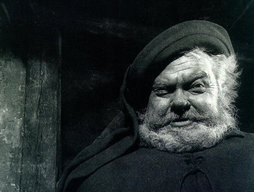“A counterfactual account of history appeals especially to people who are disappointed in the real thing. Settled fact is unsatisfying; history as it occurs seems somehow a cheat.”
Andrew Ferguson, “What Does Newt Gingrich Know?” (New York Times Magazine, June 29, 2011)
Archives for 2011
TT: Courtesy of Winslow Homer…
…here’s the view from our hotel balcony overlooking the coast of Maine:

THE SNARE OF PERFECTIONISM
“Mr. Welles’ problem was that he wanted it both ways. He was a perfectionist who expected his collaborators to sit around endlessly waiting for him to make up his mind–and to pay for all the overtime that he ran up along the way. Simon Callow, his biographer, has summed up this failing in one devastating sentence: ‘Any form of limitation, obligation, responsibility or enforced duty was intolerable to him, rendering him claustrophobic and destructive.’ That’s the wrong kind of perfectionism, and it led, as it usually does, to disaster…”
TT: Three-sister act
In today’s Wall Street Journal drama column I review two first-class shows that I saw on the road this past week, Shakespeare & Company’s The Memory of Water in Massachusetts and the Peterborough Players’ Ancestral Voices in New Hampshire. Here’s an excerpt.
* * *
Sometimes familiarity breeds not contempt but delight. The dramatic potential of funerals, for instance, is well known to playwrights and screenwriters, since they typically trigger the kind of razor-sharp focus on family life and its discontents that is the stuff of good theater. Yet the subject of death and its immediate aftermath, however familiar it may be, remains inexhaustibly fertile, and Shelagh Stephenson’s “The Memory of Water,” which had its English premiere in 1996 and was first seen Off Broadway two years later, is a prime example of a play that turns an oft-told tale into something fresh and immediate. So, too, is Shakespeare & Company’s revival a wholly satisfying piece of work, a show full of bull’s-eye moments that make you sit up straight in your seat and say, “I’ve been there–that’s just how it is.”
 One of the reasons why “The Memory of Water” rings so true is that the three bereaved sisters who are its central characters are portrayed with such eccentric individuality that you can’t help but suspect that they were drawn from life. Played to perfection by Elizabeth Aspenlieder, Corinna May and Kristin Wold, they flounder in the dark waters of sorrow, squabbling one moment and giggling together the next, each unable in her own way to come to terms with the memory of their gravely flawed mother (Annette Miller).
One of the reasons why “The Memory of Water” rings so true is that the three bereaved sisters who are its central characters are portrayed with such eccentric individuality that you can’t help but suspect that they were drawn from life. Played to perfection by Elizabeth Aspenlieder, Corinna May and Kristin Wold, they flounder in the dark waters of sorrow, squabbling one moment and giggling together the next, each unable in her own way to come to terms with the memory of their gravely flawed mother (Annette Miller).
Like an old-time prospector, Ms. Stephenson is forever finding glittering nuggets of dialogue in her pan: “Your idea of getting somewhere was marrying a dentist in a sheepskin coat from the Rotary Club.” “The funeral director’s got a plastic hand.” “I don’t think that colonic irrigation was a very good idea. Not for Alzheimer’s.” But while “The Memory of Water” plays like a comedy for much of its length, many of its most impressive moments take place when the laughter dies away without warning and the characters are overwhelmed by remembered anger and present pain….
A.R. Gurney is another playwright who rarely fails to find new things to say about old subjects, and “Ancestral Voices” ranks among his strongest efforts in that line, a portrait of a family of old-money WASPs from upstate New York whose tight ranks have been cloven by the wedge of divorce. First presented by New York’s Lincoln Center Theater in 1999, “Ancestral Voices” was written to be done as a staged reading by five actors who play multiple roles and remain seated throughout the show–but Gus Kaikkonen, artistic director of New Hampshire’s Peterborough Players, has chosen instead to mount it as a fully staged play performed by a cast of 13. Though I can’t say whether Mr. Gurney would approve, Mr. Kaikkonen has directed “Ancestral Voices” with such fluidity and attention to detail that it works at least as well in this new form.
I confess with embarrassment to having misjudged “Ancestral Voices” when I saw the original production. Back then it struck me as a white-bread rewrite of Woody Allen’s “Radio Days.” Now I find it extraordinarily moving, a searching look at a class of once-confident Americans who have (in the words of one of the characters) “lost our usefulness” and are seeking new ways to live, some more successfully than others….
* * *
Read the whole thing here.
TT: The snare of perfectionism
In today’s Wall Street Journal “Sightings” column I reflect on the problem of perfectionism in the arts. Here’s an excerpt.
* * *
 Twenty-six years after his death, Orson Welles is back in the news. “Chimes at Midnight,” the 1965 film version of Shakespeare’s history plays that occupied him throughout his middle age, will be shown in England next month in what is being billed as a “brand-new, never-seen-before restoration.” The reason why it had to be restored is that “Chimes at Midnight” was made independently and on the cheap, for by 1965 Welles had so antagonized the Hollywood establishment that no major studio would have anything to do with him. As a result, “Chimes at Midnight” was shot, edited and dubbed under sub-standard conditions, and the prints that have circulated since the film’s original release are all of low quality.
Twenty-six years after his death, Orson Welles is back in the news. “Chimes at Midnight,” the 1965 film version of Shakespeare’s history plays that occupied him throughout his middle age, will be shown in England next month in what is being billed as a “brand-new, never-seen-before restoration.” The reason why it had to be restored is that “Chimes at Midnight” was made independently and on the cheap, for by 1965 Welles had so antagonized the Hollywood establishment that no major studio would have anything to do with him. As a result, “Chimes at Midnight” was shot, edited and dubbed under sub-standard conditions, and the prints that have circulated since the film’s original release are all of low quality.
Welles’ long-standing difficulties with Hollywood are the stuff of legend. At bottom, though, they amount to this: He was a fanatical, impractical perfectionist who was willing to spend any amount of time and money on his films. But it was always other people’s money, and the moguls who put up the money in Hollywood did so in order to make still more money. After Welles made “Citizen Kane” in 1941, it was clear that he was neither interested in making box-office smashes nor willing to tolerate the relentless assembly-line discipline of the American film industry. Hence he spent most of the rest of his life wandering in the wilderness of underfunded independent film production, unable to fully realize any of his creative dreams.
Is it fair to say that Welles’ perfectionism laid him low? Every great artist, after all, strives for perfection. In fact, that’s part of what makes them great: They’re never entirely satisfied with anything that they do….
Alas, that kind of suffering goes with the territory. The trick, as every artist knows, is not to let it interfere with getting things done. The wisest artists are the ones who finish a new work, walk away and move on to the next project. Whenever a colleague pointed out a “mistake” in one of Dmitri Shostakovich’s compositions, he invariably responded, “Oh, I’ll fix that in my next piece.”
The road to malignant perfectionism, by contrast, starts with chronic indecision. Jerome Robbins, whose inability to make up his mind was legendary throughout the world of dance, was known for choreographing multiple versions of a variation, then waiting until the last possible minute to decide which one to use. Beyond a certain point, this kind of perfectionism is all but impossible to distinguish from unprofessionalism, and Orson Welles reached that point early in his career….
* * *
Read the whole thing here.
Orson Welles talks about Chimes at Midnight and the character of Falstaff in a BBC interview:
TT: Almanac
“For, in certain moods, no man can weigh this world, without throwing in something, somehow like Original Sin, to strike the even balance.”
Herman Melville, “Hawthorne and the Mosses”
TT: So you want to see a show?
Here’s my list of recommended Broadway, off-Broadway, and out-of-town shows, updated weekly. In all cases, I gave these shows favorable reviews (if sometimes qualifiedly so) in The Wall Street Journal when they opened. For more information, click on the title.
BROADWAY:
• Anything Goes (musical, G/PG-13, mildly adult subject matter that will be unintelligible to children, closes Jan. 8, all performances sold out last week, reviewed here)
• How to Succeed in Business Without Really Trying (musical, G/PG-13, perfectly fine for children whose parents aren’t actively prudish, all performances sold out last week, reviewed here)
• Master Class (drama, G/PG-13, not suitable for children, extended through Sept. 4, most performances sold out last week, reviewed here)
OFF BROADWAY:
• As You Like It (Shakespeare, G/PG-13, closes Aug. 14, reviewed here)
• Avenue Q (musical, R, adult subject matter and one show-stopping scene of puppet-on-puppet sex, reviewed here)
• The Fantasticks (musical, G, suitable for children capable of enjoying a love story, reviewed here)
IN WASHINGTON, D.C.:
• Oklahoma! (musical, G, remounting of 2010 production, suitable for children, closes Oct. 2, original run reviewed here)
CLOSING NEXT WEEK IN CAPE MAY, N.J.:
• The Understudy (comedy, PG-13, closes July 30, reviewed here)
CLOSING SATURDAY IN CAPE MAY, N.J.:
• He and She (drama, G, not suitable for small children, reviewed here)
CLOSING SUNDAY OFF BROADWAY:
• Play Dead (theatrical spook show, PG-13, utterly unsuitable for easily frightened children or adults, reviewed here)
TT: Almanac
“There should be no such profession as criticism. Musicologists, of course, are quite different, and this is a sadly neglected profession in this country–but there should definitely be no regular critics. To go through life living off other people’s work clearly has too degrading an effect.”
Benjamin Britten, “Variations on a Critical Theme”
